
|
Present
Past
Subjects
Projects
Misc

|
JULY 2001
SUNDAY, 1 JULY 2001
The lesson learned from putting a wooden deck in the garden: I am much better at arranging things after the (f)act (a posteriori) than at planning things in advance (a priori) -- both in the visual 'arranging furniture' sense (which is how I understand (interpret) myself as a sculptor, the one who shapes material but first must have material to work with) as well as in the cognitive sense (the one who works the material for the delayed riposte, the 'retrotort,' the apt remark that is produced too late to 'rejoin the conversation'; in french: esprit de l'escalier ('stairwit')).
Godard (Alphaville, 1965):
"Sometimes reality is too complex for oral communication... but legend embodies it in a form... which enables it to spread all over the world."
(While watching Alphaville again last night: The first time I saw Alphaville was at a screening at the USVA in Groningen. I went together with L. P. I'm sure we were a bit stoned -- for years the only time I/we touched cannabis was to go to the movies (and even then, for health reasons, we never smoked it but took it orally...) -- because we didn't notice/mind (at the time) that the projectionist got the last two reels of the film mixed up (creating a perfect example of ontological vertigo: where the end (fin) is not the end but still the middle).)
Godard (Alphaville, 1965):
"It was 24.17. Oceanic time when I approached the suburbs of Alphaville."
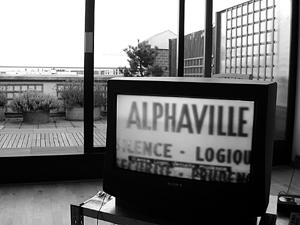
The Alphaville signpost -- watershed (with a section of the new deck in the background):
"Alphaville. Silence. Logic. Security. Prudence."
(Parallel time: MONDAY, 4 OCTOBER 1999)
MONDAY, 2 JULY 2001
Built two little tables/walls/dividers for the Alamut garden. The first was a pain (like: "just want to get this done -- okay?"), the second a pleasure (accompanied by a flood of memories of working with wood and glue).
Surprised myself by saying, "When I was at art school..." Funny, but I don't remember ever saying this before -- or at least feeling so much satisfaction from saying it.
"Back in the days when I was at art school..."
Via Metaforage: Cryptic Biodiversity. (Here's an idea: the only reason we look the same is because we've both adapted to exploit a similar niche -- in truth we are com-plete-ly different.... Cf. 31 May 1999: I live in a different world than you...)
TUESDAY, 3 JULY 2001
Concerning the old moth and flame analogy (apropos nothing in particular apropos this particular time and place) and the notion (premonition) that someone is always going to get hurt: It looks like I've become friends with a flame that moves. A bad assed flame that likes to bother dried and mounted moths. Did I say flame? Maybe I should have said flame thrower.
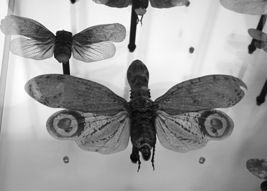
(Friday, December 3, 1999. Natural History Museum, Paris.)
WEDNESDAY, 4 JULY 2001
Spent the morning at the university in Wageningen (discussing with radiation safety officer Wim Koops how to arrange a new uranium source for Nuclear Garden II) and the afternoon in Amsterdam (meeting with Dragan Klaic, Frank van de Ven and Mark Kremer to discuss my upcoming mentorship at DasArts).

13:00 Amsterdam. The inconceivability of a technological hereafter.
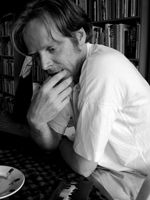
21:00 Amsterdam. Dinner with Mark Kremer.
THURSDAY, 5 JULY 2001
To stutter (to backtrack): the number of times I've used the sentence 'Take me away from all this death.'
Sunday, 8 March 1998 (Incubators and Entrepreneurs.)
Thursday, 12 March 1998 (The Future of Cities: Pessimism is the Plague.)
Friday, 24 April 1998 (Criticality (in Physics and Art) I: After mentioning the writing of Celia Green.) Friday, 15 May 1998 (After referring someone to John McCarthy's Progress and it's Sustainability site.) Wednesday, 10 June 1998 ('An Accident Waiting to Happen.') Saturday, 11 July 1998 (After a Reuters story about scientist's trying to revive frozen mammoths.) Monday, 7 September 1998 (Immortal media entry:
"Think of my own 'Nuclear Garden' in which the primary 'plant' has a half-life of 4.47 billion years...") Monday, 15 March 1999 (After ordering two packages of Welwitschia mirabilis seeds.) Monday, 14 June 1999 (At the end of a long entry on Gadamer:
The artwork can model and exemplify the complexity of a given state (subject). It can reveal patterns, afford graspability, offer entry points and escape routes between the myriad possibilities available in a way that rationality never can. It can even allow (afford) the possibility of going 'beyond' the horizon of the system space itself...
Simply: (through the artwork) experience is no longer sustained but transcended.
Click your heels 3 times and repeat after me: 'Take Me Away From All This Death'.)
Tuesday, 15 February 2000 ('Dharma Month - Dharma Year':
Is the motto, 'Take me away from all this death' so very different from the motto, 'Embracing change with all four arms'? I guess it all depends on what one means by death. Stasis is death. Sureity is death too.) Thursday, 4 May 2000 ('Deadly Serious' cryonics links following 'Akbar 'n' Jeff's Cryonics Hut.') Friday, 9 February 2001 (The last time I counted...)
FRIDAY, 6 JULY 2001
I've prepared a short text on the research theme for the next block at DasArts (which -- by the way -- stands for De Amsterdamse School/Advanced Research in Theatre Studies):
DasArts Block 15: Event Horizon
SATURDAY, 7 JULY 2001
To backtrack: my Eudora 'In box (1544 items)' sorted alphabetically by 'Who' with an email received on 5 April 2001 and completely forgotten until I found it again this morning.
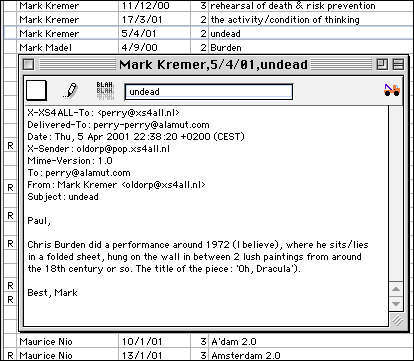
SUNDAY, 8 JULY 2001
|
P. |
Hey. |
|
R. T. |
Hey. |
|
P. |
Have you ever heard of an artist by the name of Gino de Dominicis? |
|
R. T. |
No. Uh-uh. Who is he? |
|
P. |
Italian artist. Mark Kremer told me about him the other evening at dinner. |
|
R. T. |
How do you write that? |
|
P. |
G-I-N-O. de. D-O-M-I-N-I-C-I-S. |
|
R. T. |
Noooo. Uh-uh. |
|
P. |
I'm sure Cesare has heard his name before. |
|
R. T. |
Probably. But I could never pronounce it well enough to ask him. |
|
P. |
Me neither. I'll put it in a mail to you. |
|
R. T. |
Okay. |
|
P. |
Interesting though... |
|
R. T. |
What? |
|
P. |
Mark says that sometime around 1971 Gino declared himself immortal. |
|
R. T. |
Did it work? |
|
P. |
According to Mark he died 3 years ago. |
|
R. T. |
Bummer. |
MONDAY, 9 JULY 2001
What?
Heard the craziest story Saturday evening (at the most excellent dinner party -- thanks Maudi and Camiel!) namely that Apple's logo was designed not to honor forbidden fruit but to commemorate Alan Turing's suicide. Once home, the only corroboration I could find for this extraordinary thesis (Apple's logo = Turing memorial) was this reference on a Fusion Anomaly page:
"According to Sadie Plant, in her book Zeros And Ones, Alan Turing commited suicide by eating an apple that was laced with cyanide (but this might have been unintentional as apparently he was notoriously bad at washing his hands after scientific experiments) and, he was found dead with an apple with a couple of "bytes" taken out of it, and since the rainbow is the symbol for homosexuality, which is why he was harrassed into suicide, the rainbow apple with bytes missing for the Apple Mac symbol is actually a homage to Turing."
In passing: a rainbow colored page about Turing and a link to Alan Hodges exemplary biography, Alan Turing: the Enigma.
Also discussed over dinner Saturday were the artist twins L. A. Raeven and Hillel Schwartz's book The Culture of the Copy: Striking Likenesses, Unreasonable Facsimilies.
TUESDAY, 10 JULY 2001
(Available only when one is in a certain state of retreat.)
The montage: the sequence of images one finds along the way, while reading bits from here and there, while shuffling one's papers and notes, while thinking while making a snack, while looking out the window, while watching video, while dreaming, while clicking in a web browser. (Restless montage.)
The montage: the serendipity of this order and the order in which our instincts drive said serendipity. Even more obvious when we pay attention to *the pattern of our attention*, to the pattern of our focus, to the pattern of our style and/or choice of medium (space), the pattern found in the subjective/objective duration (time) of each successive experience.
Yesterday evening's parallel time: TUESDAY, 12 OCTOBER 1999.
WEDNESDAY, 11 JULY 2001
After yesterday -- via Geegaw...
... In the way you speak
You arrange, the thing is posed,
What in nature merely grows.
To-morrow when the sun,
For all your images,
Comes up as the sun, bull fire,
Your images will have left
No shadow of themselves.
- Wallace Stevens, from "Add This to Rhetoric"
Furthermore.
Like the words of one's own inner dialogue or the intimate story one tells a friend, the weblog "in its telling hides the truth..." A form of ellipsis (ellipsis: what is left out, what is not said, what is hidden. There is no question of blame in ellipsis as the one who tells (the story teller) does not (can not) see his or her own lapses.), incomplete (teleologically incomplete), imperfect ("Life is imperfect..."), certainly a half-life (uncertain about which part will change next).
(When) John Cage (says): "I welcome whatever happens next." (one wonders who's talking...)
From Mr. Nigel Britton in London I've received a request for the source of an image of Hasan-i Sabbah in his garden at Alamut (Nigel works for a publisher who is preparing a book on the Ismaili Assassins).
He adds:
"You may be interested to hear - when I print out your journal and read it on subway trains (London) someone always reads it over my shoulder. I usually leave it behind for someone else when I get off."
HAMM: Our revels now are ended. [He gropes for the dog.] The dog's gone.
CLOV: He's not a real dog, he can't go.
- Samuel Beckett, Endgame.
|
THURSDAY, 12 JULY 2001
Politics is for dogs. Are we not men...
(Flashback to Wiretap 4.10, Sunday, 18 October 1998, where guest Mathew Fuller (later identified as an "artist cum euro-marxist die-hard") turned incredulously towards the foolish moderator and shouted, "I don't believe it! You really don't see the net as a set of power relations?")
... dancing the great big dance of love (sex) and death? Split into two (selves), the 'Dum and 'Dee: one obsessed with 'being alone', the other obsessed with 'being with.'
(Memory of the 21 year old who drove to a remote area north of the city to go 'climbing alone,' and climbing alone, fell. And in the (hours of) danger that followed learned both how much he wanted to live and that his fear of death was surpassed by his fear of dying alone: given that he had told no one where he was going, no one would know that he was dead / find his body / mourn for him.)
(Fear of) Social vs. Biological Death:
"I ask myself, why am I so frightened of an atomic war wiping out the bulk of mankind? It is true that I am frightened, and deeply upset, by the thought--so deeply that I have to ration myself how long I think about it, no more than a few seconds at a time. And I guess that most people are the same. Yet, after all, whereas an atomic war would leave some humans alive, my death, so far as I am concerned, would leave none whatsoever... It can only be, I think, that I would feel even more intensely about my own coming death, were it not that I am prevented from picturing it."
- P. N. Furbank
SATURDAY, 14 JULY 2001
23:30
I just got home and heard that my friend Helle Viirlaid passed away yesterday afternoon in Vancouver. She died of cancer. She was 50. Ewan called while I was out and left a message on the machine. He said that he and their two girls, Jessie and Kaya, "were with her throughout." He said that at least her pain was over and that in the end there'd been "a lot of it."
I spoke with Helle Tuesday evening after I got back from dinner with Sue-an and Kees. I never realised this was so close. I don't think Helle did either. Tuesday was the first time we talked with each other since I returned from Vancouver last January. Since then all contact with her has been through Ewan. Coward that I am, I found it much easier to talk with Ewan. On Tuesday Ewan happened to be out with one of the girls and Helle picked up the phone.
It was an absolutely amazing conversation. On the phone Helle sounded so incredibly positive, so incredibly warm and caring, so, well, Helle sounding. Pure Helle Viirlaid. If you didn't know better you'd never think anything was wrong. She seemed more concerned about me than herself. Helle was always like that. Her warmth towards the people she loved knew no boundaries. Her warmth was so great that it was easy to feel overwhelmed by it, and occasionally, even slightly embarrassed by it.
Tuesday evening there was no embarrassment and a hell of a lot of wonder. I'll never forget what she said or how she sounded. There wasn't a drop of self pity in her voice. Even when she mentioned the pain, you would never think she was dying. She had only one complaint: "I feel like I'm on a journey," she said, "and the worst part of it is that I can't leave Ewan and the girls somewhere along the way, somewhere fabulous, like Hawaii. I have to drag them along with me."
I can't call Ewan now. I tried calling Norman and my sister-in-law but neither of them are home. I left a message with Norman. Jente's asleep. I'll call her in the morning. I sit here and think about how I felt yesterday (very restless all day) and what I was doing at 15:30 Pacific Standard time (watching Bergman's 'The Silence'). I'm eating a bowl of ice cream.
The last thing Helle said to me, "I love you Paul."
Goodbye Helle. I love you too.

Helle and Jessie.
SUNDAY, 15 JULY 2001
How acutely the words 'I love you' ring in the face of transitoriness, in the aftermath of disappearance. When the mountain is about to leave how extraordinarily poignant the shout becomes! And when the mountain is gone and the echo hangs in the air for a moment... what on earth could be more profound than this? (How much more meaningful this is compared to when we say 'I love you' simply to affirm our (undying) resolution? Our constancy?)
MONDAY, 16 JULY 2001
|
Dear Tom,
So you're back in London!
Re: the 'bizarre-ness' of my citing a bit of Wallace Steven's 'Add This to Rhetoric' (you write to tell me that you've been reading Wallace Steven's 'Collected Works' for the last three weeks and had just stopped at 'Add This to Rhetoric' before logging on to read Alamut. You write to tell me that you had marked your place in the book with a photograph of you and Mark Waller "jumping into a river in France, frozen in mid-jump").
I don't know Tom. This sort of strange shit happens to me all the time. (Case in point: I rented two movies Saturday, Bokanowski's L'Ange (I made the trip to the library specifically to get this film) and Herzog's Nosferatu (a spontaneous rental. I've watched the film before but decided on the spot that I wanted to look at it again.) Returning home I happened to notice (via Generosity's update list) that Jamie had updated his weblog (the boy has been remiss of late). Lo and behold what has Jamie just published but a movie review wherein he sings the praises of Herzog's film, "If you really really want to watch a vampire movie, go rent Nosferatu by the unbeaten Werner Herzog." (I disagree about the unbeaten bit. I find Dreyer's Vampyr and Coppola's adaptation pretty exciting too, but that's besides the point.))
If we listen to Dr. Freud and his theory of the 'uncanny', we may conclude that we are both obsessionally neurotic:
"In the case history of an obsessional neurotic, I have described how the patient once stayed in a hydropathic establishment and benefited greatly by it. He had the good sense, however, to attribute his improvement not to the therapeutic properties of the water, but to the situation of his room, which immediately adjoined that of a very accommodating nurse. So on his second visit to the establishment he asked for the same room, but was told that it was already occupied by an old gentleman, whereupon he gave vent to his annoyance in the words: 'I wish he may be struck dead for it.' A fortnight later the old gentleman really did have a stroke. My patient thought this an 'uncanny' experience.
"The impression of uncanniness would have been stronger still if less time had elapsed between his words and the untoward event, or if he had been able to report innumerable similar coincidences. As a matter of fact, he had no difficulty in producing coincidences of this sort; but then not only he but every obsessional neurotic I have observed has been able to relate analogous experiences. They are never surprised at their invariably running up against someone they have just been thinking of, perhaps for the first time for a long while. If they say one day 'I haven't had any news of so-and-so for a long time', they will be sure to get a letter from him the next morning, and an accident or a death will rarely take place without having passed through their mind a little while before. They are in the habit of referring to this state of affairs in the most modest manner, saying that they have 'presentiments' which 'usually' come true."
(From Freud, 'Das Unheimliche' (The Uncanny) full text.)
Ja. Ja. What do you think?
Best,
-- Paul
|
|
Dear Stefan,
Apropos your mentioning Michel Serres' Angels: A Modern Myth during our meeting the other day -- a book which, incidently, I did not know, or rather, confused with another book; so thanks! what with your making me a copy (and binding it!) of Elias Canetti's The Numbered (Die Befristeten) and your Serres reference, your visit was filled with gifts! -- do you know Patrick Bokanowski's film L'Ange (The Angel)? I've been looking at it for the last two nights now and like Serres' book, there is very little information about this film online. (Yet another example I suspect of the net's gaping lacunae.)
What do you think of these blind spots? Would you think me or my words trite If I were to say, "Bokanowski's film is a meditation on light"? But it's true. L'Ange is a meditation: on light and light's absence, on obsessional repetition, on a trip through the Bardos, madness. There is no dialogue but a musical score (by Bokanowski's wife Michele and it's magnificent). And while the film is not 'polished' every part of it feels hyper (obsessively) considered... (from the little information that I can find it seems Bokanowski spent 2 years filming the actors and sets and 3 years editing and adding special effects).
If you don't already know it, I think you'd like it.
Best,
-- Paul
|
TUESDAY, 17 JULY 2001
Speak of the double...
Ever wonder in exactly which parallel world Francis Ford Coppelius Coppola did his version of E. T. A. Hoffmann's The Sand-man?
WEDNESDAY, 18 JULY 2001
What remains after a day like this? A day like many others. Like most days: of feeding hunger, restlessness, nervous restless montage. A day of escapology (where refuge is sought in a flurry of clicks and little gusts of stress).
What remains? (besides the dissatisfaction of Steve Job's keynote at MacWorld NY?)
(1) A paragraph found while searching for information on Stan Brakhage's 'The Act of Seeing with One's Own Eyes':
"The themes of the corpse and the image are also developed in Maurice Blanchot's "Two Versions of the Imaginary." Blanchot's essay argues that "The cadaver is its own image" because both the cadaver and the image continue to "affrim things in their disappearance." By making a film which depict the cadaver Brakhage creates a sort of mise-en-abyme, an image of an image."
-- Louis Schwartz, from Seeing Absence: Traversing The Documentary Phantasy by The Act of Seeing With One's Own Eyes.
(2) The knowledge that Kristeva has taken to writing murder mysteries.
THURSDAY, 19 JULY 2001

Black hole hidden under white blanket or 'Under the pavement the breach'. Public library. 10:00 hrs.
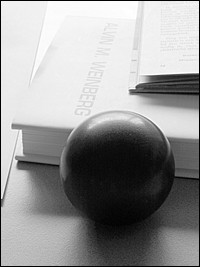
Graphite HTR fuel ball (model) resting on Dr. Aliki van Heek's desk. 15:00 hrs.
FRIDAY, 20 JULY 2001
Being alone and being with.
(What she saw. What I see. What you see.)
From the Black Holes FAQ:
"My friend Penelope is sitting still at a safe distance, watching me fall into the black hole. What does she see?
"Penelope sees things quite differently from you. As you get closer and closer to the horizon, she sees you move more and more slowly. In fact, no matter how long she waits, she will never quite see you reach the horizon."
SATURDAY, 21 JULY 2001
(Outside this, outside the space-time of flows: what she did not see; what I, watching her (from within the space-time of flows), see; what you, watching me, see.)
Tom's reply:
|
Dear Paul,
I think Freud is a bit patronising. I, too, have had this experience - twice with what Pynchon would call 'incoming mail' episodes, i.e. you dream of someone arriving, via hotel lobbies, airports, lifts, pager boys etc and lo and behold you get a letter from them the next day, or you get them themselves. Once the dream even had a policeman and a skateboard keeping the 'arrivee' company and the next day the arrivee arrived just as I was skateboarding out of college where a policeman had come to arrest the college cook.
Now, I was having a conversation with Margarita Gluzberg about this just the other day. We agree on this one: we reckon that there are two perfectly un-mystical ways of explaining this. One is simple law of averages: if you dream of bananas twenty times over a five year period, it's likely that you're going to encounter a banana the next day at least once. Bananas plus policemen plus skateboard plus friend from dream actually arriving (out of the blue, as it goes) less often, maybe only once or twice ever - whence its rarity and excitingness. That's the mundane angle on it, which it seems to me is pretty uncontestable.
The other angle is a kind of (let me stress) non-hippy 'There is more to heaven and earth, Horatio, than ever dreamt of in your philosophy' line. Freud would totally approve of it: he knew more than anyone (Burroughs is another person who really appreciated this) about second-stream awareness. Your conscious mind only gets to process a fraction of all the data going through your entire mind, and hence is going to miss out on a vast amount of stuff that you actually 'know' without knowing you know. So it's perfectly feasable that an entire chain of associations connecting your consciousness to an event taking place elsewhere is recoverable and reconstructable by the former, but largely bypasses the rational sector thereof. En plus, wherever there's data and lines of communication there's interference, like when your mobile signal gets tapped out over the cd player. I even heard of a woman who could pick up Radio Four via a tooth-filling (I imagine her moving her cheeks and jaw around and thereby bending and distorting at will the sounds of the shipping forecast and test match, the opinions of Start the Week afficionados: 'A wooonder- fillfirst NOOOOOOvel, vaaaaary poooostMODurrrrrrrrrrn, whit do YOOOuu thinhkk Jer-em-ayyyyyyyyyyyy?').
So re Stevens: I can't reconstruct entirely the chain of events that led you to quote 'Add This to Rhetoric' on your site or me to pause at that particular poem - but I would point out that we were both present when Simon Critchley praised Stevens as 'the greatest philosophical poet of the Twentieth Century' at the Office of Anti-Matter in March. Attempting to reconstruct the chain would be an interesting exercise, but for my money 'inflecting' the collision of events is more exciting - i.e. acknowledging it, cherishing it, assigning meanings to it which are largely arbitrary, DIY ones. That's what poetry's about in the first place, after all. And friendship too.
Having said that, as a child I used to play this game in the last ten minutes of the homeward leg of car journeys where I had to change one phrase (a catchphrase from an advertising billboard we'd just passed, say, like 'Small ones [oranges] are more juicy') into another (like the last line my mother had said, 'Wait till we get home' or something) by repeating the first and modulating it into the second as I repeated it again and again (a bit like the Radio Four tooth lady), and if I didn't manage to completely modulate it in time or made too perceptible a jump in sound between one repetition and another then the whole world would explode. So there were people everywhere, world leaders and throngs of normal citizens, glued to their tv screens watching to see whether I'd make it and save the planet. I invariably did, and gave long post-event interviews to the world's media afterwards, along the lines of 'I nearly lost it just as we were going past Greenwich Hospital, but recovered just in time by channelling the 'ui' of 'juicy' into the 'o' of 'home'.' So maybe my response to the Herr Doktor's observations would be a self-help book called 'Understand Obsessional Neurosis and Do it Anyway'. Again, that title could be the mute subtitle to almost all poems, I reckon. New formula: The Task of the Poet is to Save the World by Playing Around with Received Sounds While Being Driven Slowly Home. Think of Stephen Daedalus on the beach in 'Ulysses', going 'Mouth to my mouth, mouth to my moombh, oom, allwombing tomb.'
I'll send you the picture of me and Mark drifting downward to darkness on extended wings when I've scanned it in.
For now,
Tom
|
SUNDAY, 22 JULY 2001
|
Dear Norman,
It's Sunday morning and I'm sitting outside in my little garden. It's been raining here for what seems like weeks (probably not so long if you actually counted days, but take my word for it, the bench is wet), this morning we've been granted a reprieve with a bit of sun and cloud.
Nothing beats Sunday morning in Holland. It's the most quiet and peaceful of times -- the only discernable sound this moment coming from a couple of squabbling magpies -- and is especially good when that bit of sun hits one's face (it's true, by the way, that the body instinctively responds to the sun's warmth, even when it's virtual or 'imagined', as Greg Egan's unwilling protagonist (who has just awakened as an upload) discovers within minutes of his stepping outside his house in Permutation City:
"Paul closed his eyes and turned his fact to the sun. In spite of everything, it was hard not to take solace from the warmth flooding onto his skin. He stretched the muscles in his arms, his shoulders, his back -- and it felt like he was reaching out from the 'self' in his virtual skull to all his mathematical flesh, imprinting the nebulous data with meaning; binding it all together, staking some kind of claim. He felt the stirrings of an erection. Existence was beginning to seduce him...").
It's good to sit outside. Inside gets filled up so quickly (stuffed, gorged) while outside remains comparatively empty. One feels the space out here. Existence. It is only outside that one feels that things can happen.
I've been telling myself this a lot lately: the artist is someone who allows things to happen to themselves. It's a matter of receptivity (think of Orpheus tuning his car radio dial to be able to hear messages from the underworld in Cocteau's version of the story). The danger though, is showing too much enthuasism for the messages (obsession: you said on the phone obsession / obsessiveness is way of 'ordering' grief. I said it was a way of 'ordering' fear.) for what appears to her as simply noise and thereby lose her, ie. either Eurydice (if you're being faithful to the myth) or that other sweet thing you're trying so hard to seduce (if you're not). For she'll inevitably say: "I don't understand you."

(Delphine Seyrig)
Outside and receptive, the artist is no solipsist, inside and living alone with his or her 'thoughts', like that sucking solipsist Dracula / Nosferatu. Do you remember how Stoker has the Count express his habitat preferences to the solicitor / real estate agent Harker?
"We Transylvanian nobles love not to think that our bones may lie amongst the common dead. I seek not gaiety nor mirth, not the bright voluptuousness of much sunshine and sparkling waters which please the young and gay. I am no longer young; and my heart, through weary years of mourning over the dead, is not attuned to mirth. Moreover the walls of my castle are broken; the shadows are many, and the wind breathes cold through the broken battlements and casements. I love the shade and the shadow, and would be alone with my thoughts when I may."
Abridged by Kinski in Herzog's film to the following two lines (listen to how Kinski pronounces the word 'alone' with a german inflection but then like a wolf: a-l-o-o-o-o-ne...):
"I don't attach importance to sunshine anymore or to glittering fountains which you are so fond of. I love the darkness and the shadows where I can be alone with my thoughts."
And further abridged by P. J. Harvey in her rock anthem, 'Dry' (from Rid of Me):
I'm sucking on the well
I'm sucking 'till I'm white...
Re 'every day presents another chance to start anew' discussed during yesterday's phone call. I've been thinking a lot lately about how one 'pumps' oneself up with coffee -- blood -- stress from the day's get go, pumps oneself up with obligations (a full agenda), responsibility (tons of work) or (dare I mention what you claimed?) service. One 'girds one's loins', one 'steels' oneself, one 'politicizes' oneself, but to what purpose? Simply to take action? Or simply to be able to take action, where any action at all is seen as a move to escape the gravity well? (gravity well: In Beyond the Pleasure Principle Freud claims the 'instinct to return to the inanimate state' as the primary instinct or force. According to Freud, in the beginning...
"The attributes of life were at some time evoked in inanimate matter by the action of a force of whose nature we can form no conception. It may perhaps have been a process similar in type to that which later caused the development of consciousness in a particular stratum of living matter. The tension which then arose in what had hitherto been an inanimate substance endeavoured to cancel itself out. In this way the first instinct came into being: the instinct to return to the inanimate state. It was an easy matter at that time for a living substance to die; the course of its life was probably only a brief one, whose direction was determined by the chemical structure of the young life.
"For a long time, perhaps, living substance was thus being constantly created afresh and easily dying, till decisive external influences altered in such a way as to oblige the still surviving substance to diverge every more widely from its original course of life and to make every more complicated détours before reaching its aim of death. These circuitous paths to death, faithfully kept to by the conservative instincts, would thus present us today with the picture of the phenomena of life. If we firmly maintain the exclusively conservative nature of instincts, we cannot arrive at any other notions as to the origin and aim of life.
"The implications in regard to the great group of instincts which, as we believe, lie behind the phenomena of life in organisms must appear no less bewildering. The hypothesis of self-preservative instincts, such as we attribute to all living beings, stands in marked opposition to the idea that instinctual life as a whole serves to bring about death. Seen in this light, the theoretical importance of the instincts of self-preservation, of self-assertion and of mastery greatly diminishes. They are component instincts whose function it is to assure that the organism shall follow its own path to death, and to ward off any possible ways to inorganic existence other than those which are immanent in the organism itself.")
Is this not ironical? For it seems to me the more we 'pump' ourselves up in order to escape personal entropy (our gravity well), the more we drive ourselves inwards towards its center. Is this not a perfect example of a tension which 'endeavours to cancel itself out' or consciousness which only desires its own particular brand of amnesia? ("Just give me animal mentality...").
But I ramble. As a matter of fact, I started this note to tell you about a Bergman film I watched last night. But I'll save that for another time.
Give my love to Valerie.
-- Paul
|
MONDAY, 23 JULY 2001
Considering Bergson's distinction between perception and intuition (full texts of Bergson's Matter and Memory, Time and Free Will, and Creative Evolution online) this quote from 3 years ago certainly bears repeating:
"When intellect becomes intuition it sheds prose like a snakeskin. In this sense, art is necessary because it constitutes the only possible language of such a re-birth."
From Peter Lamborn Wilson, Scandal: Essays in Islamic Heresy.
TUESDAY, 24 JULY 2001
(It's only when it gets rare and finite that it becomes precious and valued.)
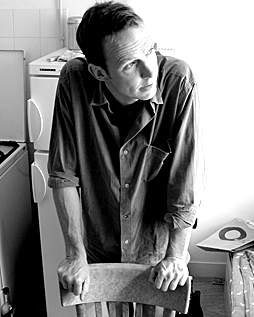
16:00 Amsterdam. Frank van de Ven. Dancer.
WEDNESDAY, 25 JULY 2001
Lots going on here these days. Lots of new information. Lots of 'co-incidences.' Lots of distractions.
The kindness of strangers: Grinnell Almy mailed me a photocopy of 'The Teacup Whale' by Lydia Gibson, one of my favorite childhood stories. ("There are depths even in a household where a whale can live..." The Whale in the Blue Washing Machine and the Teacup Whale: 7 February 2000.)
Two sparkling drops from the flood of information, co-incidences, and distractions:
(For N.)
"We know that things and people are always forced to conceal themselves, have to conceal themselves when they begin. What else could they do? They come into being within a set which no longer includes them and, in order not to be rejected, have to project the characteristics which they retain in common with the set. The essence of a thing never appears at the outset, but in the middle, in the course of its development, when its strength is assured."
- Gilles Deleuze, Cinema 1: The Movement-Image.
(For D.)
"Most 'writers' and 'filmmakers' address the social person in us; a small number address the solitary person; but there are others still, rare, who address the one who, for whatever circumstances, is in a state of depersonalization -- they accompany someone even when he has deserted himself. Since these instances of depersonalizaton are rare, and since one does not wish to be reminded of them, the latter writers and filmmakers, books and films, are not popular."
- Jalal Toufic, Forthcoming.
THURSDAY, 26 JULY 2001
Ontological Vertigo:
"...the only time that we ever know what's really going on is when the rug's been pulled out and we can't find anywhere to land."
- Pema Chödron on the truth of the first noble truth. (Ref: 6 February 2000, the 'flying carpet' entry.)
Speaking of vertigo and the opportunities presented when 'shit happens' -- tonight I witnessed a small example of both while walking home from the meeting organised by a Rotterdamse Kunst Stichting and the CBK to discuss the plans for a large 'park area' northwest of the city.
Walking home for me always means crossing one of the bridges over the Mass. Tonight this was the high bridge, the Erasmus bridge. As I approached the bridge's highest point I spotted a young man and a young woman (well dressed, maybe 'just friends', maybe not) standing in the dark at the railing. The man was visibly upset. As I was passing his phone rang, loudly, playing one of those cheerful little melodies. Whipping it out of his pocket -- it being tiny, silverish, expensive looking -- he exclaimed something about 'the damned thing going off every 10 minutes' and threw it (with a loud 'kut ding') in a single smooth movement over the railing. The girl, visibly shocked, whispered 'Goh...' and craned her neck to see if she could see it hit the water (it's a long way down) while the young man started to cry. I passed them and kept walking.
FRIDAY, 27 JULY 2001
After reading a bit of the guidebook I got this afternoon (yes, I was finally able to find a return flight, I'm going next week) I suddenly remembered a kid who helped once prepare a house to receive a special guest, and that kid telling the others present (I think one girl in particular) that he wanted to move to Beirut because it was in Beirut that 'reality' was happening. I'd completely forgotten this. This having occurred in a house in North Vancouver around the end of the 70's. Stupid huh?
The idea of walking backwards has popped up a lot lately: in Frank van de Ven's proposed '24 hr. sustained inquiry' project for the DasArts block, in Jalal Toufic's chapter 'Backward Movement' in his book (Vampires), and in the following 'short talk' by Anne Carson, 'On Walking Backwards' (swiped from Caterina. Thanks C!):
"My mother forbad us to walk backwards. That is how the dead walk, she would say. Where did she get this idea? Perhaps from a bad translation. The dead, after all, do not walk backwards but they do walk behind us. They have no lungs and cannot call out but would love for us to turn around. They are victims of love, many of them."
SATURDAY, 28 JULY 2001
What separates the men from the boys boys from the men: (1) an active interest in the world, (2) an active interest in what happens next, (3) general excitement.
28 July 2000: "The mind which plunges into Surrealism relives with glowing excitement the best part of its childhood."
I used to believe that art keeps one young, but it could also be that those who have a propensity to 'youngness' become artists. 28 July 1999: Susan Sontag defines intelligence as a taste for ideas.
Mr. Lira describes an uncanny experience involving weblogging.
SUNDAY, 29 JULY 2001
You write stuff down so you can forget it -- it may be that someone else, some other 'you', reads what you've written, and tries to connect back to you, but for you it's gone-gone.
I called Ewan yesterday evening. He said: "Seven months is too short. It happened so fast. I wish we could do it all over again."
I watched Ozu's Tokyo Story last night.
MONDAY, 30 JULY 2001
I'm off for a few days. Back soon.
June 2001
ALAMUT.COM is artist owned and operated.
feedback@alamut.com
Page created: 1/7/01
Last modified: 6/8/01

|

|










